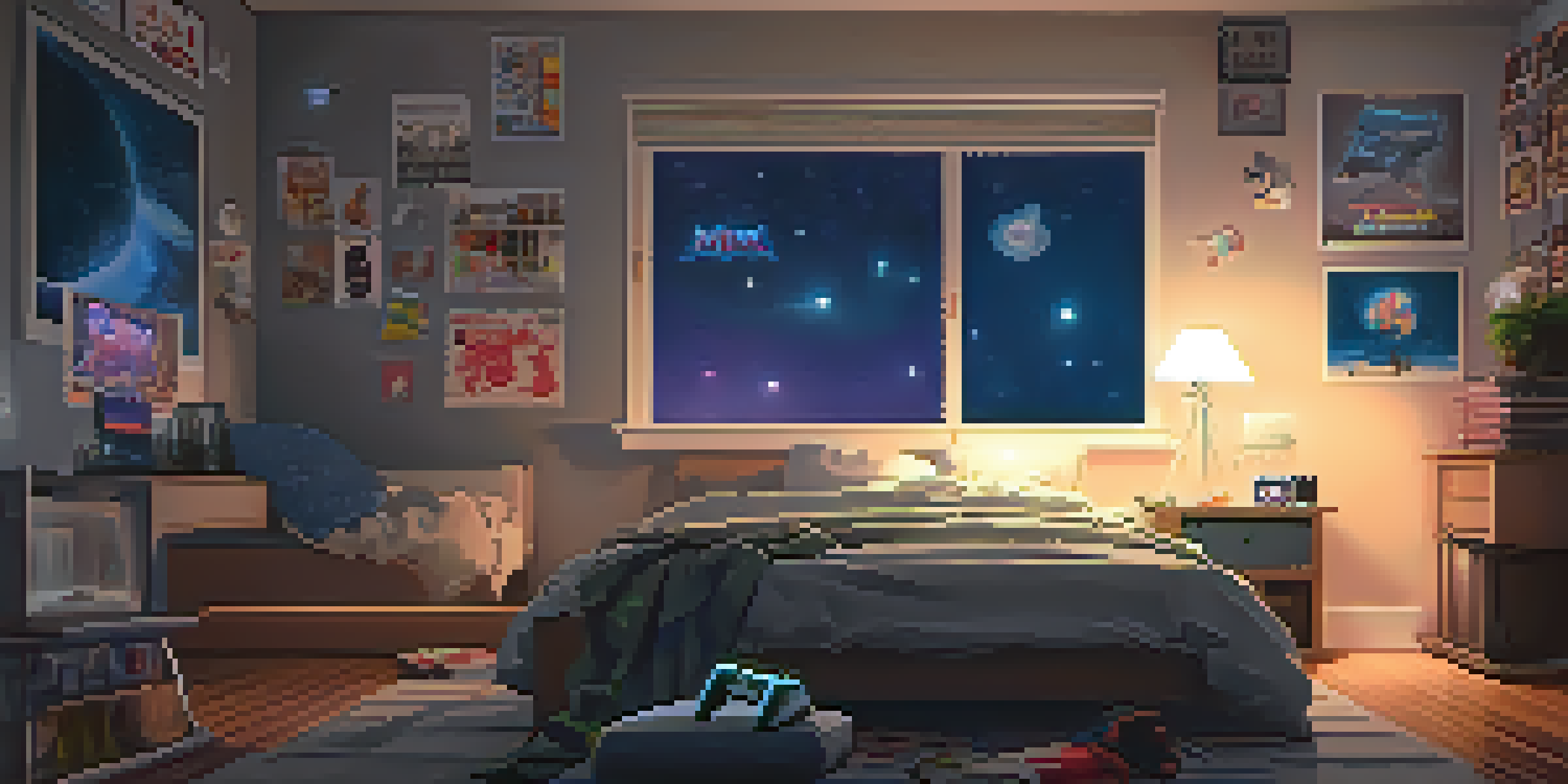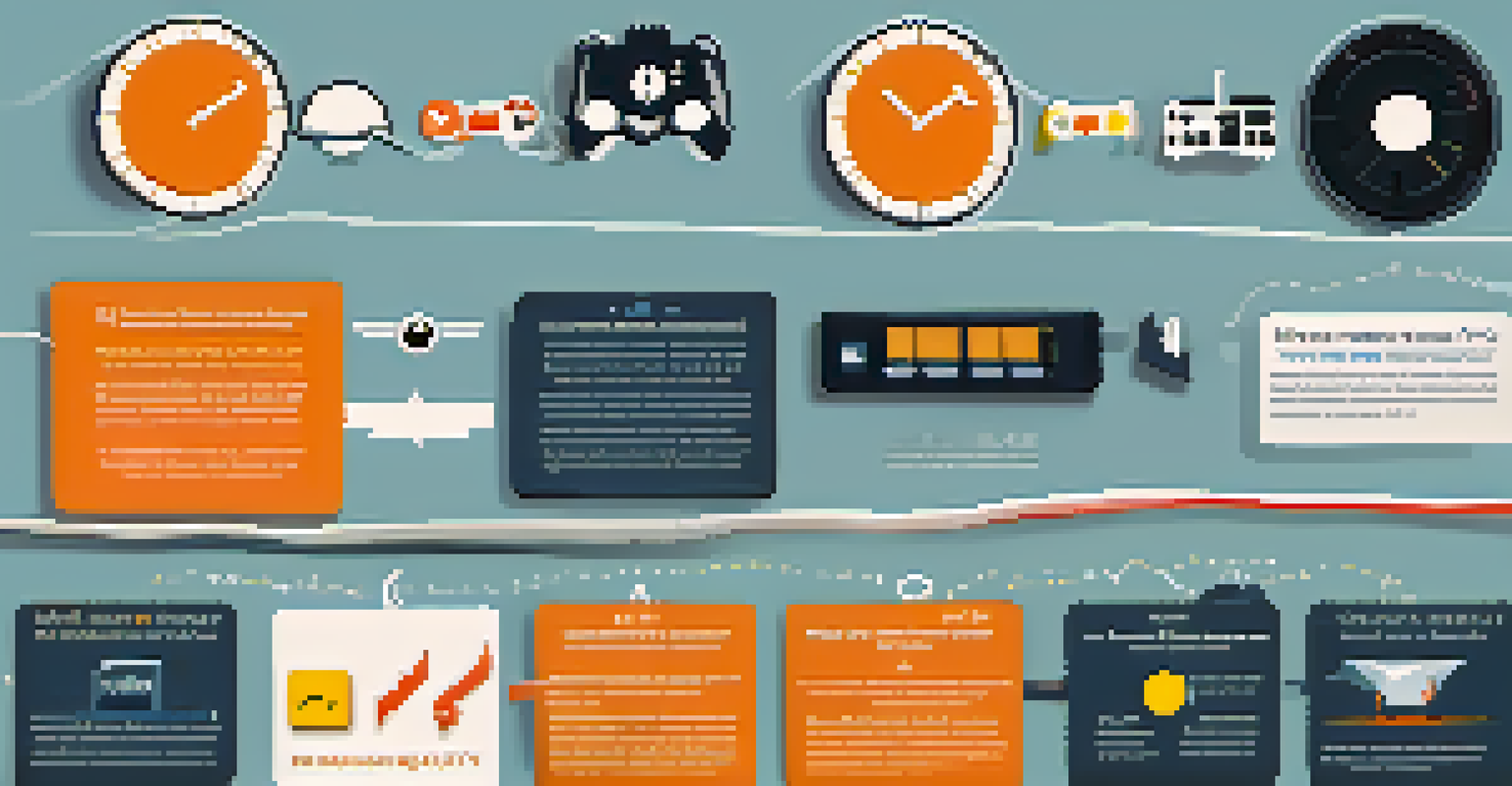The Impact of Video Games on Sleep Patterns: A Study

Introduction: The Gaming and Sleep Connection
In today’s digital age, video games have become a staple in entertainment, captivating millions worldwide. As fun and engaging as they may be, there are growing concerns about their impact on our sleep patterns. Understanding this connection is crucial, especially since sleep is essential for overall well-being and cognitive function.
Sleep is the best meditation.
Studies suggest that the time spent playing video games can interfere with sleep schedules, often leading to late-night gaming sessions. This can result in insufficient sleep, contributing to various health issues, including fatigue and decreased focus during the day. The allure of immersive gameplay can sometimes overshadow the importance of a good night’s rest.
In this article, we’ll delve into the ways video games affect our sleep, drawing on recent studies and expert opinions. By exploring different aspects of this relationship, we aim to shed light on how to strike a balance between enjoying gaming and prioritizing our sleep health.
Understanding Sleep Patterns and Their Importance
Before we dive deeper, let’s clarify what sleep patterns are. Essentially, sleep patterns refer to the timing, duration, and quality of sleep that individuals experience. A typical sleep pattern involves cycles of light and deep sleep, which are crucial for physical and mental restoration.

Quality sleep enhances memory, mood, and overall health, while disrupted sleep can lead to a host of problems, including anxiety, poor concentration, and weakened immune function. Therefore, maintaining healthy sleep patterns should be a priority for everyone, especially gamers who may not realize the repercussions of their late-night gaming habits.
Gaming Disrupts Sleep Patterns
Video games can interfere with sleep due to blue light exposure and heightened mental stimulation.
Understanding the importance of sleep patterns helps us appreciate why examining the impact of video games on these patterns is vital. By recognizing the potential risks, gamers can make informed choices about their gaming habits and prioritize their health.
How Video Games Disrupt Sleep Patterns
One of the primary ways video games disrupt sleep patterns is through the blue light emitted by screens. This light can interfere with melatonin production, a hormone that regulates sleep. When players engage in gaming late into the night, their brains receive signals that it’s still daytime, which can delay sleep onset.
A good laugh and a long sleep are the best cures in the doctor’s book.
Additionally, the excitement and adrenaline rush from gaming can keep the mind active, making it difficult to wind down. Even after putting the controller down, players may find it hard to transition from a high-energy state to a calm one, leading to restless nights. This cycle can perpetuate itself, causing a decline in both sleep quality and quantity.
Moreover, competitive gaming can lead to increased stress and anxiety, particularly when players are invested in their performance. This added pressure can further exacerbate sleep issues, creating a detrimental loop that affects both gaming performance and overall health.
The Role of Game Content in Sleep Disruption
Not all video games are created equal when it comes to their impact on sleep. Fast-paced, action-oriented games often lead to heightened arousal and excitement, which can make it harder to relax afterward. In contrast, slower-paced games or those with calming themes may have a less disruptive effect on sleep patterns.
For instance, a thrilling multiplayer shooter might get players so engaged that they lose track of time, while a puzzle game might offer a more relaxing experience. Understanding the type of game being played can help gamers make choices that align better with their sleep needs.
Age Influences Sleep Impact
Younger gamers are more vulnerable to sleep disruptions due to flexible schedules and developmental needs.
Being mindful of the content and intensity of games can empower players to maintain a healthier gaming routine. By selecting games that promote relaxation, players can enjoy their favorite pastime without significantly compromising their sleep quality.
Age Factors: How Different Age Groups are Affected
Age plays a significant role in how video games affect sleep patterns. For example, teenagers and young adults, who are often the most avid gamers, may be more susceptible to sleep disruptions compared to older adults. Their bodies and brains are still developing, making adequate sleep even more critical during these formative years.
Additionally, younger players often have more flexible schedules, leading to late-night gaming sessions that can interfere with their sleep. Conversely, older adults may have established routines that prioritize sleep, making them less likely to engage in late-night gaming marathons.
Understanding these age-related differences can help tailor strategies for managing gaming habits across different demographics. Encouraging healthier gaming practices for younger players can foster better sleep patterns and overall well-being.
Strategies for Balancing Gaming and Sleep
Finding a balance between gaming and sleep is essential for maintaining good health. One effective strategy is to set a specific gaming curfew. By designating a time to stop gaming each night, players can ensure they have ample time to unwind before bed, promoting better sleep hygiene.
Another approach is to create a wind-down routine that includes relaxation techniques, such as reading or meditating, after gaming sessions. This can help transition the mind and body from an active state to a restful one, making it easier to fall asleep.
Strategies for Better Sleep
Setting gaming curfews and creating wind-down routines can help balance gaming enjoyment with sleep health.
Additionally, players should monitor their gaming content and choose games that are less likely to interfere with sleep. By implementing these strategies, gamers can enjoy their favorite hobby while still prioritizing their sleep health.
Conclusion: Prioritizing Sleep in the Gaming World
As video games continue to evolve and captivate audiences, it’s crucial to recognize their potential impact on sleep patterns. By understanding how gaming influences our sleep, players can make informed choices that enhance both their gaming experience and their overall health.
Prioritizing sleep doesn’t mean sacrificing gaming; rather, it’s about finding a healthy balance that allows for enjoyment without compromising well-being. By implementing strategies to manage gaming habits, players can protect their sleep and, in turn, improve their performance both in-game and in daily life.

Ultimately, being mindful of gaming habits can lead to a more enjoyable and fulfilling gaming experience, one that supports both mental engagement and physical health.